This gluten free pie crust is awesome to work with! I developed it for KitchenAid’s new 13-Cup Food Processor with ExactSlice System. It’s the perfect gluten free crust! If you’d desire, you can even weave a top lattice crust using this dough. It is a lighter crust than typical pie crusts, similar to a pâte brisée, which is a half fat (butter and/or shortening) and half flour ratio. However, in this recipe, I used quite a bit more flour. I just wanted to lighten up a regular crust a bit. It turned out an amazing gluten free pie crust, as it was not dry at all, but moist, flavorful and flaky.
One of the secrets to a flaky pie crust is to use very cold butter. I froze 1/2-inch cubed butter several days in advance. I suggest overnight, but if you’re in a hurry, 15 minutes will work. Using iced water is also key. When testing out this recipe I made a chicken pot pie (pictured below). I’ve never cared for them, even when I wasn’t gluten free, but with this crust, I went back for seconds! I hope you feel the same.
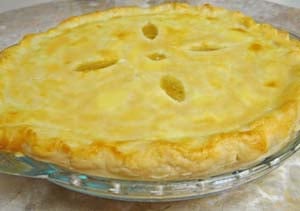
The perfect gluten free pie crust - light,and flaky; dough is so easy to handle you can even weave a lattice top crust. Use with sweet or savory recipes.
Ingredients:
- 2 1/2 Carla's Gluten-Free All-Purpose Flour Blend Recipe, plus more for dusting
- 1 teaspoon fine sea salt (or salt)
- 1 teaspoon sugar (or sugar substitute)
- 1 cup (2 sticks) unsalted butter, cut into 1/2-inch cubes, frozen preferably overnight, (for dairy-free try 1/2 cup shortening and 3/4 cup Earth Balance spread)
- 8 - 9 Tablespoons iced water
- 1 egg white
- 2 Tablespoon butter, melted (for double crusted pie, less for single)
Instructions:
- Add flour, salt, and sugar to food processor fitted with standard chopping blade; pulse to mix well; add frozen butter.
- Pulse several times, scraping sides and bottom with provided spatula, as needed, until mixture forms the size of peas and smaller.
- Add 1 tablespoon of ice water at a time, pulsing between additions. Use the least amount of water as possible, as too much water will create a tough crust. You want to stop pulsing right before it forms a dough, but when pinched, sticks together.
- Transfer dough to a flat surface very lightly dusted with flour; with the palm of your hand, flatten dough to form approximately a 1/2-inch high disk. (Flattening those butter pieces creates a flakier crust.)
- Using a pastry scraper or thin, metal spatula, if needed, remove dough from surface and form into 2 disks (I use a kitchen scale for preciseness); and dust lightly dust with flour; wrap each disk, separately, in plastic wrap; refrigerate at 1 - 48 hours.
- Remove one disk from the refrigerator, allowing the other to stay chilled. If the dough has been refrigerated for more than 1 hour, allow it to rest at room temperature for about 5 minutes. Roll out disk onto a lightly flour dusted surface to approximately 1/8-inch thick and 12-1/4-inches round.
- Place a rolling pin on top of the left side of the rolled dough; using a pastry scraper or thin metal spatula, lift dough up towards rolling pin.
- Roll dough around the rolling pin.
- Carefully transfer to a 9-inch pie pan.
- Press dough down and along sides, allowing 1/4-inch edge to overlap onto rim.
- For a single pre-baked crust, freeze dough for 30 minutes before baking; line crust with parchment paper; fill with weights (dry beans, rice, pie weights, etc.); bake at 350°F for 20 minutes; poke holes in bottom crust with a fork; bake an additional 10 minutes. For a double crust, brush bottom with egg white. Both prevent a soggy bottom crust. If pre-baking a crust you will need to tent the edges of the crust with aluminum foil (or Martha Wrap) during the actual pie baking once it browns.
- Add filling to the bottom pie crust.
- Roll out second disk onto a slightly floured surface to 12 1/4-inches; transfer to top of filled pie; seal edges together; trim excess crust to allow a 1/2-inch overhang.
- Tuck the extra 1/2-inch under the 1/4-inch overhang of the bottom crust; either using your left index finger and right thumb at the same time, or use the tongs of a fork to seal or crimp.
- Cut several slits in the top crust, and open them up a bit or cut out a design (if you don't they may reseal during baking). This allows the steam to escape to prevent a soggy crust.
- Baste top crust with egg white; bake as directed by your recipe (pot pies about 40 minutes); after 10 minutes baste with melted butter; baste with melted butter every 10 minutes or until it reaches a golden brown.
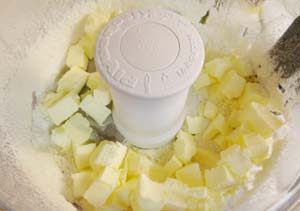
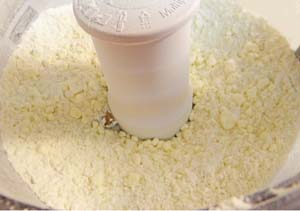
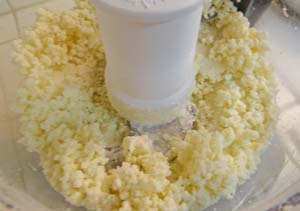
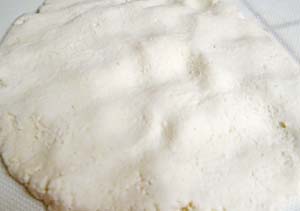
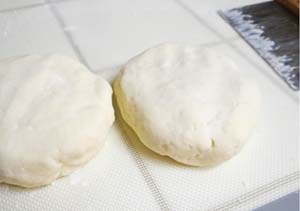
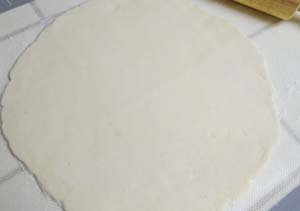
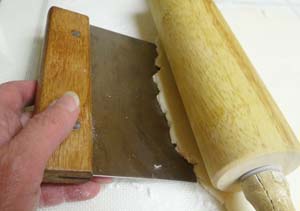
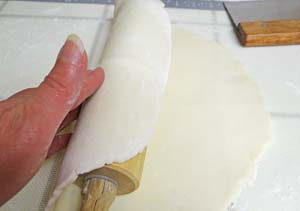
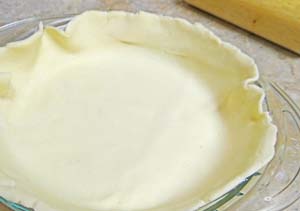
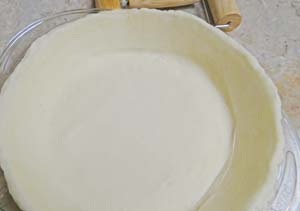

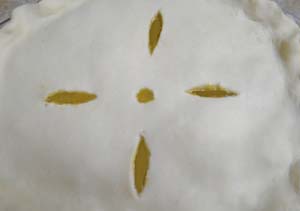
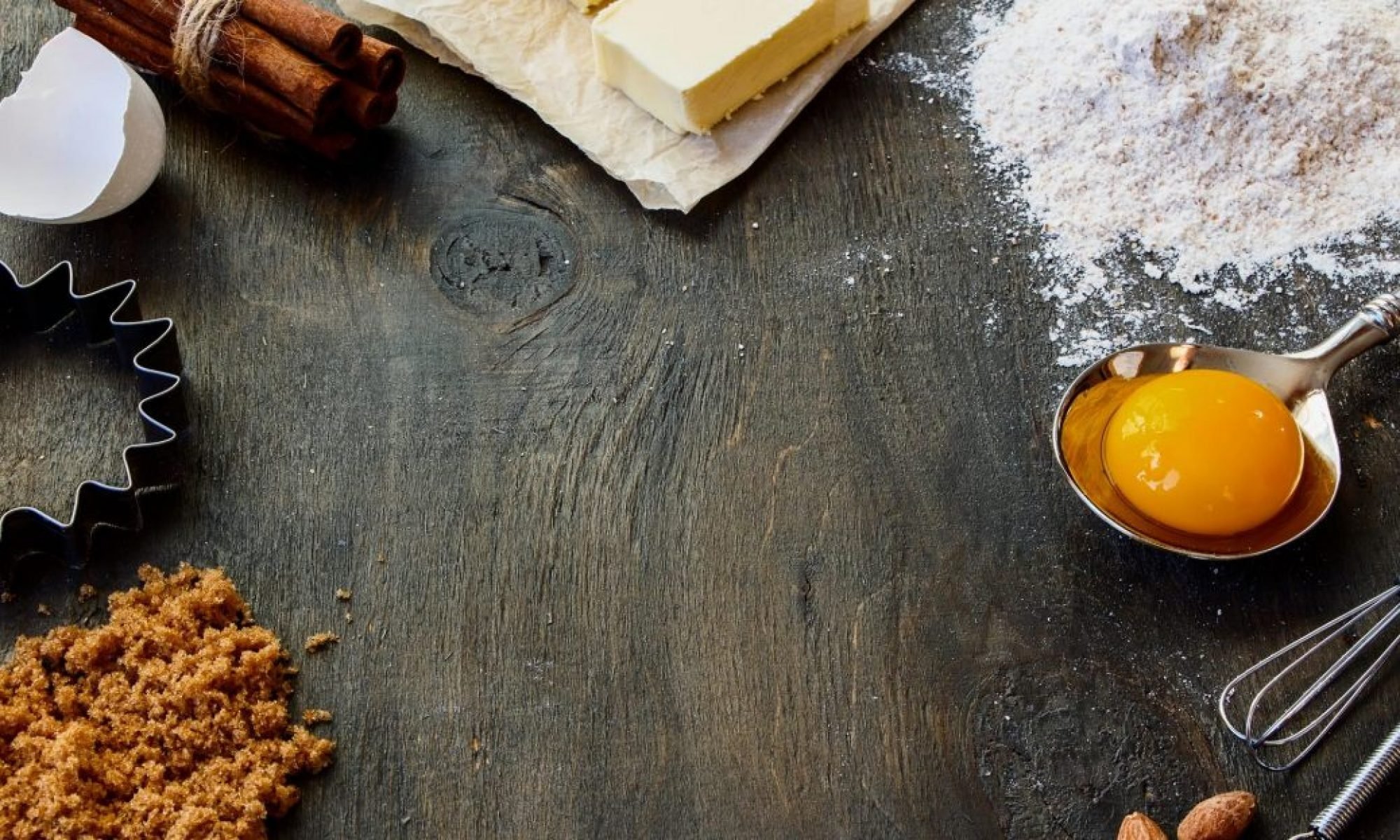


Would I be able to make this crust up to the point of forming it in the pie dish…but use a foil like disposable dish and then freeze it? Then take it out of the freezer when needed…of course not let it sit in the freezer for to long. :)
Amy,
You should be able to freeze this crust before it is baked.
Enjoy,
Carla
Hi Carla,
I have used many of your recipes, all have been really good, thank you.
I don’t use volume measure, I weigh all my ingredients using metric units because my own experience with volume measure has been inconsistent results, weighing removes the variations of sifted/packed/sighting at an angle etc.
Substituting ingredients such as superfine brown rice and superfine white rice flours which have different weights for the same volume has a big effect on the final result.
Do you weigh ingredients when you are developing recipes? Could you publish recipes with weights?
Thanks.
Mike.
I’ve made this crust several times and it is wonderful. It was
easy to roll and tastes great. I may be gluten free but do not
like many of the baked goods. My mom always added a little
extra (2 tablespoons) of Crisco to make her crust flaky and
easy to roll. I added 2 tablespoons extra butter and it worked great. Thanks for the recipe.
In searching for a gf pie crust for Thanksgiving, I ran across your website. This recipe sounds wonderful, but I was wondering…in making a gluten pie crust I was told the secret was to add vinegar to the dough. Would adding a little vinegar to the gluten free version help in rolling out the dough? If so, what amount would you recommend?
Thank you for all of your wonderful recipes!
Happy Thanksgiving,
Sharon
Hi Sharon,
Anything acid will make the pie crust puff up a bit. If this is what you desire in a pie crust, by all means add it. Butter and shortening, however, make it flaky. I have used baking powder and vinegar in my Easy Gluten Free Phyllo Dough Recipe: http://glutenfreerecipebox.com/gluten-free-phyllo-dough/ and use it for a pie crust sometimes. I enjoy it as well.
Thanks,
Carla
Hi- I’ve been reading that adding vodka rather than water makes for a flakier crust. Do you think this would work with this recipe?
Thanks-
Macha,
Alcohol adds moisture and is used in gluten crusts because it does not add any gluten to the crust. In this recipe moisture would only make the crust softer, not flaky.
Vodka is also supposed to help you roll out your dough easier. See the article that the creator of the vodka method wrote here: http://sweets.seriouseats.com/2011/07/the-food-lab-the-science-of-pie-how-to-make-pie-crust-easy-recipe.html.
I hope this helps.
Carla
Hi Carla,
Thanks for your recipe. My dough was very soft and sticky to work with. It felt very buttery to me. I did freeze the butter before hand. I managed to roll it out anyway but the crust turned out crispy and slightly hard. What could my mistake be?
Dawn
Hi Dawn,
You are welcome.
Most of the time when people have trouble with my recipes calling for my all-purpose flour recipe, they have either used regular rice flour instead of “superfine” or they used some other brand or homemade mix. The only brand of superfine rice flour that I use or know about is made by Authentic Foods. In case you didn’t use my flour blend recipe, you will find it at http://glutenfreerecipebox.com/gluten-free-all-purpose-flour-blend/.
Let me know if this was not case for you.
Carla
Could I use 1/2 egg replacer instead of egg white? Have grandson allergic to eggs too.
Hi Lori,
That should work! Or try making the tapioca gel found at http://glutenfreerecipebox.com/gluten-free-egg-substitute.
Enjoy!
Carla
Carla,
I have always made my pie crust (gluten) with all Crisco, for the flakiness. Would that work with your gluten-free pie crust instead of the of butter?
Debbie, I would imagine so. It’s your typical pie crust recipe. It’s easier in a double pie crust. Single ones, you’re risking the crust to fall down on the sides if pre-baked. I only suggested the Earth Balance for additional flavor. All shortening crusts will be more flakier, but will lack flavor. If your filling is good, that should be sufficient, though.
In addition, be sure to use “superfine” rice flour(s).
Enjoy!
Carla
Thanks, Carla,
One further question, if I used shortening in place of butter, would it be 1 cup shortening in place of 1 cup butter? I ask because the dairy free option is 1/2 cup shortening and 3/4 cup Earth Balance totaling 1- 1/4 cups. Haven’t used Earth Balance, so unfamiliar with it’s properties.
Debbie,
I read that whey using part margarine, part shortening you should increase the shortening. Since Earth Balance is similar to margarine, I thought I’d suggest it here. When using all shortening, expect a crisper crust, not necessarily a flakier one, as I suggested earlier. It will also be drier due to lack of water from that butter contains. Perhaps adding a bit more water help, but not too much, or your crust will be tough.
Do let us all know how it turns out.
Carla
Should I omit the sugar for a savory pie crust – or is it okay to leave it since it is such a small amount? Thanks!
Sara,
You leave the sugar in for savory crust. It’s barely noticeable, 1 teaspoon. Omitting, it though, may make the crust less tender, and easier to transfer to the pan. I left it in when I made my chicken pot pie.
On another note, be sure to use “superfine” rice flour, not regular. It is more dense, and fine. If you do not have superfine you can find it in my online store: http://glutenfreerecipebox.com/store. Or you can try grinding regular rice flour in a coffee grinder. I haven’t tried it myself yet.
Enjoy!
Carla